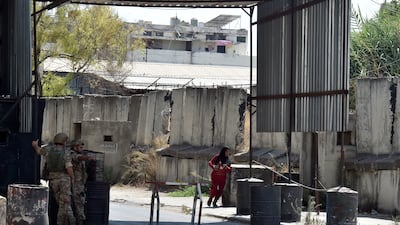Lebanon’s caretaker prime minister on Thursday threatened army intervention to stem days of heavy fighting between rival factions in the country’s largest Palestinian refugee camp which has left at least 13 dead and dozens injured.
In a phone call to Palestinian president Mahmoud Abbas – also the head of the Fatah party, which wields considerable power in Lebanon’s refugee camps – prime minister Najib Mikati demanded an end to armed clashes which have threatened to spill out of the Ain al Hilweh camp and into the coastal city of Saida.
"The army and all of Lebanon's security forces are going to perform the required role in maintaining security and halting the fighting," Mr Mikati told Mr Abbas, according to a statement released by his office.
Mr Mikati called the fighting a “flagrant violation of Lebanese sovereignty” and said it was unacceptable for the warring Palestinian groups to “terrorise the Lebanese”.
Already the clashes have resulted in dozens injured and thousands of people displaced from the camp, according to the UN Relief and Works Agency for Palestinian refugees. Hundreds of families are sheltering in the agency's schools and in mosques until it is safe to return to the camp.
Ain Al Hilweh is notorious for harbouring fugitives and Islamist gangs. The camp has been the site of a power struggle between Palestinian factions and a network of extremists for over a decade.
Two people were killed and around 10 injured in renewed fighting between Islamist insurgent groups and Palestinian factions overnight, according to a member of the Popular Committees, a coalition of representatives that run the camp, on Thursday – bringing the death toll up to 13.
“It was a very bleak night. The clashes lasted until dawn,” he told The National.
“People can't take it any more,” he added. “We fall asleep every night to the music of bombs.”
The fighting, which has continued despite a ceasefire being agreed on Monday, had subsided by Thursday morning.
While clashes between rival factions are not uncommon, this week’s battles have been especially ferocious due to assassination of high-profile Fatah commander Abu Ashraf Al Armoushi and four of his bodyguards on Sunday.
Fatah identified the assailants as members of the militant group Jund Al Sham and allied groups.
Palestinian political officials have warned that a long-term ceasefire in the camp would be on the condition of the surrender of Mr Armoushi’s killers.
While periods of calm have punctuated the camp’s atmosphere over the last few days, heavy fighting has routinely continued to erupt.
Videos of the battle shared with The National by camp residents showed a series of rockets hurtling overhead, while explosions were heard in the distance.
Fatah, the strongest political faction in Lebanon’s Palestinian camps, has for years attempted to contain the presence of outlaws and smaller networks of insurgents who seek to gain control of Ain Al Hilweh.
Asbat Al Ansar, an Islamist fundamentalist group with an operations base in the camp and allied with the Islamist militant groups accused of killing Mr Armoushi, issued a statement distancing itself from this week's clashes and claimed the ceasefire was broken by Fatah.
“We were surprised, at exactly nine o’clock this evening, by a violent attack on our centres and mosques in the Al Ta’ara neighbourhood and Al Safsaf neighbourhood by unruly elements of the Fatah movement,” it said.
The group added that it refused to engage in clashes between Fatah and Islamist factions despite the death of one of its own members this week.
“We assure our Palestinian and Lebanese people that we have not and will not be dragged into these clashes, whatever the price,” the group said, calling on political leaders to find an end to the conflict.
Ain Al Hilweh is home to more than 50,000 registered refugees. Many of them came from coastal towns in northern Palestine.
Lebanon’s Palestinian refugee camps present fertile ground for fugitives and outlaw groups to flourish owing to a contentious decades-old agreement that, for the most part, prevents Lebanon’s military from entering them.
But the Lebanese military does intervene in some rare cases. Notably, Ain al Hilweh is also home to some of the 30,000 Palestinian refugees displaced from the Nahr Al Bared camp, which was destroyed in 2007 during 15 weeks of fighting between the Lebanese army and extremist groups.
Some of those militants expanded into Ain Al Hilweh following the conflict.


